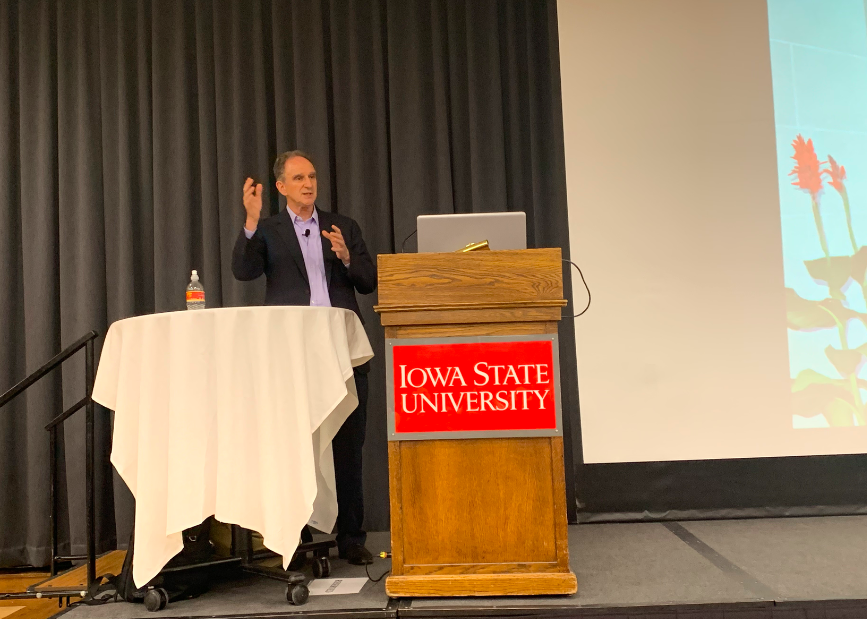Lecturer brings the conversation and re-evaluation of current national and global security
Amber Mohmand/ Iowa State Daily
Martin Hellman, a professor emeritus of electrical engineering at Stanford University, spoke about national security in the Sun Room at the Memorial Union.
November 20, 2019
Former Stanford professor opened up the discussion and re-evaluation of current national security methods in the United States at a lecture Wednesday.
Martin Hellman, a professor emeritus of electrical engineering at Stanford University, spoke about “The Technological Imperative for Ethical Evolution,” at 7 p.m. Wednesday night in the Sun Room of the Memorial Union.
The lecture was based on opening up a conversation and rethinking current methods of handling national and global security regarding nuclear weapons, cyber-attacks, terrorisms and environmental crises.
“Nuclear weapons, environmental crises [and] genetic engineering are symptoms of a deeper underlying problem,” Hellman said. “Which is this chasm between our godlike physical power through technology and our — at best — irresponsible adolescent behavior.”
Hellman is also a member of the Federation of American Scientists with his scientific interest coming from his own research involving risk analysis to any potential failures of preventing nuclear disasters.
“We don’t just need to solve these problems, we need to become much more responsible, and we need to be much smarter about how we behave, and the world will be much better,” Hellman said.
Hellman said discussing the issue through political conversations and coverage in the media would help the population make their own judgement about national security.
John Chandara, sophomore in computer science, said he agreed with Hellman and the conversation about technology does not cover enough about the ethics and adapting to change.
“Emotional intelligence doesn’t come from knowing,” Chandara said. “It’s half knowing and half application. Meaning that you can know everything about emotional intelligence but whether you know when to apply it is the bigger issue.”
The topic of national security through nuclear weapons, cyberattacks and climate is a conversation everyone can participate in and it is non-partisan, Hellman said.
“Bringing it up politically, like if you go to a rally [and] ask that question […] people are going to pay attention,” said Emily Randall, an attendee of the lecture and an Iowa State alumna.
The development of technology should also come with change in mindset, Hellman said. Two big lessons of his came from his former instructor.
“Humanity is capable of the radical changes needed for survival in the nuclear age, this was before climate change was a big issue, that’s the better hypothesis,” Hellman said. “The less noble hypothesis is that we’re doomed, and Harry pointed out if they accept the less noble hypothesis, we are doomed. […] If we accept the noble hypothesis the worst that happens, […] we go down fighting, and the best that happens is we cheat the grim reaper, we succeed and we continue this awesome, unbelievable evolutionary arc on which humanity is currently posed. So Harry ended this [lesson] by saying ‘what’s the harm in assuming this noble hypothesis?’ It made sense to me then, and it makes sense to me now.”

















